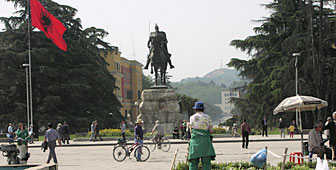Patience is the key for Albania

Switzerland is one of the key foreign donors to Albania but Swiss diplomats say the road to recovery remains a long one.
Albania was the last of Europe’s former communist countries to turn towards democracy and a free market economy. For 50 years it remained completely closed to the outside world, maintaining diplomatic ties only with China. Their totalitarian leader, Enver Hoxha, told the Albanian people that they were living in the world’s only paradise.
Religion was forbidden, so too were owning a car and listening to or watching foreign media. Thousands of people became political prisoners, those who remained free learned to keep quiet and follow the rigid rules of the state.
Hardly surprising, then, that diplomats like Francis Cousin, Switzerland’s ambassador to Albania, believe change and improvement will only come slowly.
“Of course it’s an uphill struggle,” Cousin told swissinfo. “We as international observers tend to be a bit impatient, we want to see big achievements quickly. But this country was closed for decades, so it’s understandable that it won’t change from one day to the next.”
Education a priority
Since Albania moved towards democracy in 1991, Switzerland has invested over 100 million francs in technical and humanitarian support in the country. Key sectors are health, education, and energy.
“Albania has a chronic energy shortage,” Cousin explained. “Power cuts happen all the time. Here in the embassy we have our own generator, but often in winter, when we go to meetings with Albanian officials, we are sitting round the table in our overcoats.”
Unemployment is also a serious problem; although official figures put the jobless rate at 18 per cent, unofficial estimates suggest it is actually more than twice that. And for those with jobs, salaries are low; the average income is a mere $1,100 per year.
Thomas Ruegg, of the Swiss Agency for Development and Cooperation (SDC), coordinates Switzerland’s aid projects in Albania. He believes better education and training is crucial if young Albanians are to have a real future in their own country.
“We are putting a lot of emphasis on education,” Ruegg told swissinfo. “For example we sponsor vocational training courses for young people. In the town of Durres we have a project where they can train as electricians, welders, or mechanics.”
Difficult decade of democracy
But despite the success of these and other Swiss projects, the pace of change in Albania remains slow, and every year, many of the country’s brightest young people leave, hoping to find a better future in a foreign country.
Ruegg believes one factor is the lack of faith in the national government, which many Albanians now see as at best unreliable, and at worst, corrupt.
“I think people have become a little bit fatalistic,” Ruegg said. “From our standpoint at SDC we don’t sense that the people have much confidence in the government.”
“But we have to remember it’s hard for the government too,” Ruegg continued. “Albania has had to reinvent itself many times over the last 10 years. They had the disaster of the pyramid investment scheme in 1997, followed by near civil war in 1998, and then the Kosovar refugee crisis in 1999. So it’s a difficult situation.”
Local initiatives more successful
What Ruegg has discovered is that a micro rather than a macro approach is more likely to be successful, when it comes to getting SDC projects off the ground.
“Sometimes the results at government level are too slow for us,” he said. “We have found that when we work at the grass roots level we get better and quicker results.”
“What this means is that we need to work harder at institution building here in Tirana. But we probably have to be more patient than we are.”
Boomtown Tirana
In fact, of the changes to have taken place in Albania over the last ten years, the most visible are to be seen in the capital Tirana. Cars, once a rarity, now clog the city streets.
Modern apartments blocks are springing up all over, and stylish restaurants and cafés are opening on every street corner.
But behind the superficial boomtown appearance, serious poverty remains. Prices in the new shops and restaurants are out of reach of ordinary Albanians, and most homes, new or old, suffer daily electricity and water shortages.
Ambassador Francis Cousin is not discouraged though; instead he admits he is prepared for the long haul, pointing out that it is in Switzerland’s long term interest to promote stability in Albania.
“These are our neighbours,” he explained. “Albania is only a two-hour flight from Switzerland. And we have seen what happens when there is a conflict in the region; the people come to us.”
“But yes, sometimes it is hard,” Cousin continued. “We expect things to happen much faster. Again, we need to be more patient, and to hope that with perseverance we can achieve results.”
By Imogen Foulkes in Tirana

In compliance with the JTI standards
More: SWI swissinfo.ch certified by the Journalism Trust Initiative
You can find an overview of ongoing debates with our journalists here. Please join us!
If you want to start a conversation about a topic raised in this article or want to report factual errors, email us at english@swissinfo.ch.